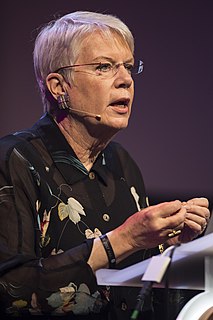Top 18 Quotes & Sayings by Jill Tarter
Explore popular quotes and sayings by an American scientist Jill Tarter.
Last updated on April 15, 2025.
Life has evolved to thrive in environments that are extreme only by our limited human standards: in the boiling battery acid of Yellowstone hot springs, in the cracks of permanent ice sheets, in the cooling waters of nuclear reactors, miles beneath the Earth's crust, in pure salt crystals, and inside the rocks of the dry valleys of Antarctica.
I can actually build my equipment at the back end of the telescope such that it takes the data from all of the separate antennas and adds the signal together with different time delays and different phase shifts - it's as if I were picking out up to eight individual pixels in this large field of view.
Might it be the discovery of a distant civilization and our common cosmic origins that finally drives home the message of the bond among all humans. Whether we're born in San Francisco or Sudan or close to the heart of the Milky Way Galaxy, we are the products of a billion-year lineage of wandering stardust. We, all of us, are what happens when a primordial mixture of hydrogen and helium evolves for so long that it begins to ask where it came from.
The space that we're looking through is nine-dimensional. If you build a mathematical model, the amount of searching that we've done in 50 years is equivalent to scooping one 8-ounce glass out of the Earth's ocean, looking and seeing if you caught a fish. No, no fish in that glass? Well, I don't think you're going to conclude that there are no fish in the ocean. You just haven't searched very well yet. That's where we are.
We are made out of stardust. The iron in the hemoglobin molecules in the blood in your right hand came from a star that blew up 8 billion years ago. The iron in your left hand came from another star. We are the laws of chemistry and physics as they have played out here on Earth and we are now learning that planets are as common as stars. Most stars, as it turns out now, will have planets.





















